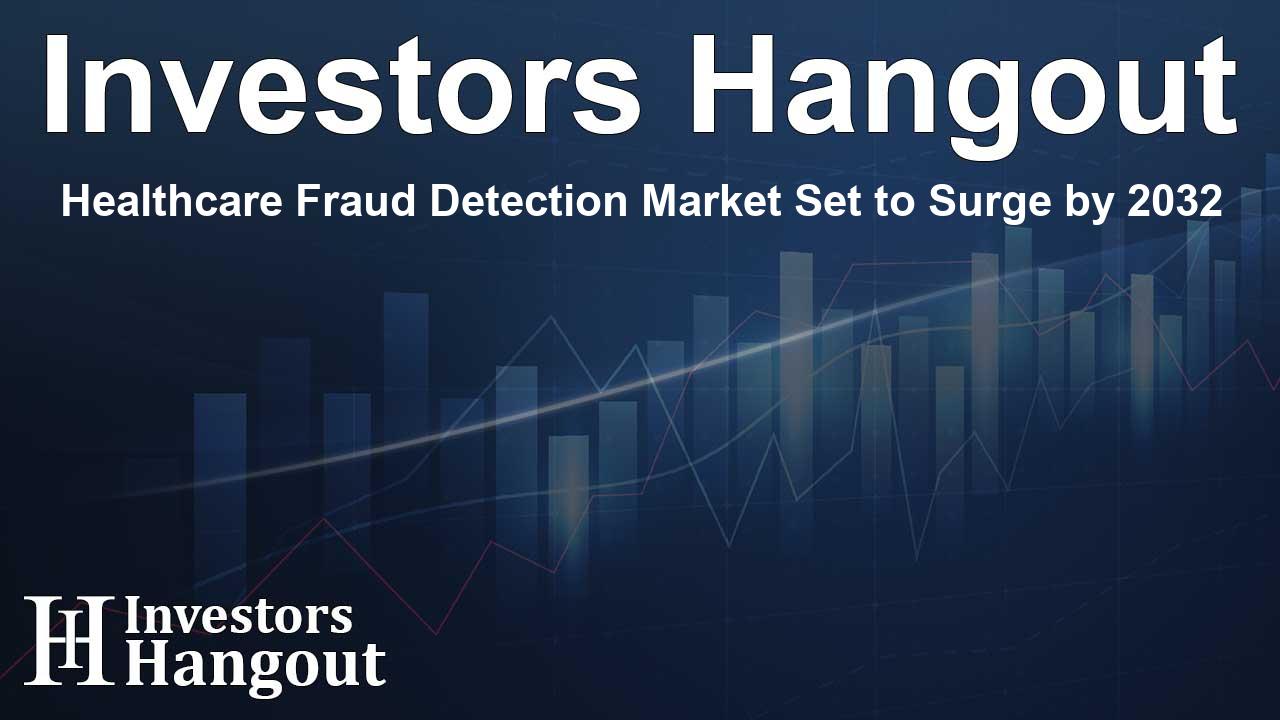Healthcare Fraud Detection Market Set to Surge by 2032

Exploring the Growing Healthcare Fraud Detection Market
The healthcare fraud detection market is undergoing a significant transformation, anticipated to reach USD 15.36 billion by the end of the forecast period. Driven by increased instances of healthcare fraud and the rising integration of advanced analytics solutions, this dynamic sector reflects a compelling growth trajectory.
Dynamic Growth in Healthcare Fraud Detection
Recent studies indicate that the market, initially valued at USD 2.54 billion, is projected to experience an astronomical growth at a compound annual growth rate (CAGR) of 21.66% from 2024 to 2032. This surge is primarily fueled by the burgeoning sophistication of fraudulent schemes and the essential need for effective detection mechanisms.
As healthcare fraud becomes increasingly complex, stakeholders are investing in advanced technologies. The demand for robust fraud detection methodologies is evident as organizations aim to safeguard their financial resources and maintain operational integrity amidst a surge of fraudulent activities.
The U.S. Market's Position in Healthcare Fraud Detection
In 2023, the U.S. healthcare fraud detection market stood at USD 0.76 billion, with projections to escalate to USD 4.45 billion by the conclusion of the forecast period. The United States holds a prominent place in the North American healthcare fraud detection landscape, significantly influenced by common fraudulent activities such as billing fraud and identity theft.
Investment in Advanced Systems
The increasing prevalence of healthcare fraud has prompted public and private institutions alike to elevate their investments in specialized analytics and artificial intelligence-based systems. These investments are crucial for mitigating risks associated with fraudulent claims. The U.S. continues to lead in adopting these technologies, enhancing detection capabilities and securing sensitive data.
Key Players in the Healthcare Fraud Detection Landscape
Several industry leaders are at the forefront of the healthcare fraud detection market, introducing innovative solutions that cater to the evolving demands of the sector. Prominent companies such as IBM Corporation, SAS Institute Inc., and Optum, Inc. offer a range of advanced tools designed to combat fraudulent transactions effectively.
Role of Software Solutions
In 2023, the software segment commanded an impressive 70.20% of the market share, underscoring the critical role software solutions play in modern fraud detection. With the capacity to automate complex data processing and enhance integration with electronic health records, these solutions are invaluable in detecting and preventing fraud in real-time.
Segment Dynamics and Insights
The healthcare fraud detection market is segmented based on solution type, delivery mode, component, and application. Notably, the descriptive analytics segment has proven crucial, holding a 40.12% share in 2023 due to its effectiveness in identifying past trends and irregularities.
Market Trends and Future Projections
The future of the healthcare fraud detection market appears promising, with North America leading the charge, accounting for a 42.36% market share in 2023. The region's established healthcare infrastructure and increasing fraudulent claims necessitate effective fraud detection systems.
Meanwhile, the Asia Pacific region is anticipated to reach impressive growth rates of 22.72% CAGR during the forecast period. Factors such as expanding healthcare infrastructure and heightened awareness of fraud in countries like India and China significantly contribute to this growth.
Challenges and Opportunities
The expanding healthcare fraud detection arena presents both challenges and opportunities for healthcare providers and insurers. As the landscape evolves, organizations must remain vigilant against fraudulent schemes while ensuring compliance with regulatory requirements. The integration of AI technologies into existing detection frameworks represents a pivotal opportunity to enhance effectiveness in combating fraud.
Frequently Asked Questions
What is the projected growth rate of the healthcare fraud detection market?
The healthcare fraud detection market is projected to grow at a CAGR of 21.66% from 2024 to 2032.
Why is the U.S. leading in healthcare fraud detection?
The U.S. leads due to a high prevalence of fraudulent schemes, prompting significant investments in advanced analytics and AI technologies.
What role does software play in fraud detection?
Software solutions play a critical role by automating data processes and enabling real-time detection of fraudulent claims.
How does descriptive analytics affect fraud detection?
Descriptive analytics helps organizations identify historical fraud patterns and billing irregularities, forming a crucial part of detection strategies.
Which regions are poised for the highest growth in healthcare fraud detection?
The Asia Pacific region is expected to experience the fastest growth, driven by increasing digitalization and awareness of fraud issues.
About The Author
Contact Hannah Lewis privately here. Or send an email with ATTN: Hannah Lewis as the subject to contact@investorshangout.com.
About Investors Hangout
Investors Hangout is a leading online stock forum for financial discussion and learning, offering a wide range of free tools and resources. It draws in traders of all levels, who exchange market knowledge, investigate trading tactics, and keep an eye on industry developments in real time. Featuring financial articles, stock message boards, quotes, charts, company profiles, and live news updates. Through cooperative learning and a wealth of informational resources, it helps users from novices creating their first portfolios to experts honing their techniques. Join Investors Hangout today: https://investorshangout.com/
The content of this article is based on factual, publicly available information and does not represent legal, financial, or investment advice. Investors Hangout does not offer financial advice, and the author is not a licensed financial advisor. Consult a qualified advisor before making any financial or investment decisions based on this article. This article should not be considered advice to purchase, sell, or hold any securities or other investments. If any of the material provided here is inaccurate, please contact us for corrections.
